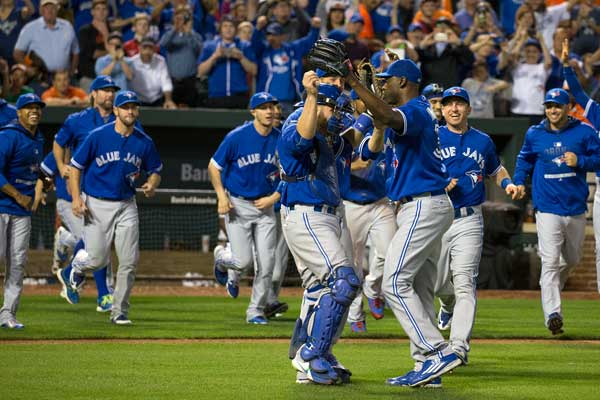
Toronto Blue Jays’ psychologist on the importance of channeling emotions, maintaining perspective
Published: October 16, 2015
The Toronto Blue Jays face the Kansas City Royals tonight in the American League Championship Series, after a riveting duel with the Texas Rangers.
Fans who witnessed the team’s rocky start in its last game and smashing comeback after a seventh-inning outrage likely feel psychology plays a key role on the field. But what does the Jays' own psychologist say?
Faculty of Medicine writer Carolyn Morris spoke with Jays’ psychologist and U of T professor Brian Shaw to find out more about the mental fine points of the sport.
What are the most important psychological barriers you need to work on with high-level athletes like the Jays?
For elite performers – from high-level athletes to surgeons or litigators – one of the biggest challenges is to maintain perspective. Despite the high stakes and huge pressures, it is key for the players to remember that baseball is still a game. It’s a sport – it’s challenging and difficult – but it’s also supposed to be fun. This isn’t an easy sell, especially considering everything that’s riding on these games and how many of these elite athletes tend to be very self-critical. When used for improvement and learning, this self-criticism can be OK. But not when it’s used for abuse and judgment. So this is where things like “stir the pot” or chanting in some sports come in, they’re bonding exercises and they lighten the pressure and bring some perspective back.
The second thing is energy management. Most athletes have no problem getting charged up for a game, in fact they often get supercharged. And that’s where you make mistakes. So you have to calm your excitement levels to the extent that you can perform.
The third thing we work on is visualization and mental imagery, to be ready to act in a sequence of events. And the fourth is working on focus. Keeping your mind on the game despite screaming fans, the lights, the action and everything else. You have to get to the point where none of this will affect you.
In the fifth game against the Texas Rangers, what effect do you think the anger over the 7th inning incident – where the Rangers scored after the catcher’s throw hit the bat – could have had on the team’s performance? They seemed to launch into a wildly successful comeback right after that.
I think it’s a fight or flight scenario, so incidents like that can give players a lot of energy. Anxiety and anger are kissing cousins, though, and you have to watch out because outright anger can lead to swinging wildly or doing too much. I think the anger was channeled. Instead of losing it, you need to be able to keep calm enough to perform at your best. When everyone’s losing their heads around you, elite athletes have learned how to keep their energy and excitement in check.
What strategies are most successful for keeping your mind in the game?
There’s a long history of chanting and singing in sports like soccer and rugby, and many sports have these types of bonding exercises, which keep the fun in the game. Other techniques like deep-belly breathing and other ways of focusing and calming yourself down are common. Another big thing is visualization. Professional athletes probably do more homework in this area than university students! They go over what they need to do in any sequence of events repeatedly, using mental imagery. There are also a variety of concentration and attention techniques to practice quieting the mind to focus in on the game and avoid distraction.
How important is the role of the psychologist in high-level sports?
Professional sports teams have had psychologists on board for around 25 years. In the Olympics it’s been even longer. As teams look for how to improve performance to give them that edge, psychological factors have become important. Many athletes who have come this far already have a lot of the psychological skills – the mental toughness – but as the stakes get higher sometimes they need more support. It’s just like how most people can walk across a plank of wood when it’s six inches off the ground, but bring it up 600 feet and almost no one can do it. So the team psychologist is like another coach – like a Sherpa guide for the mind – helping strengthen the players’ psychological skills. At this point for the Jays I’m more of a maintenance worker, though, as they have more or less mastered these skills.



